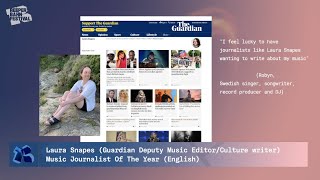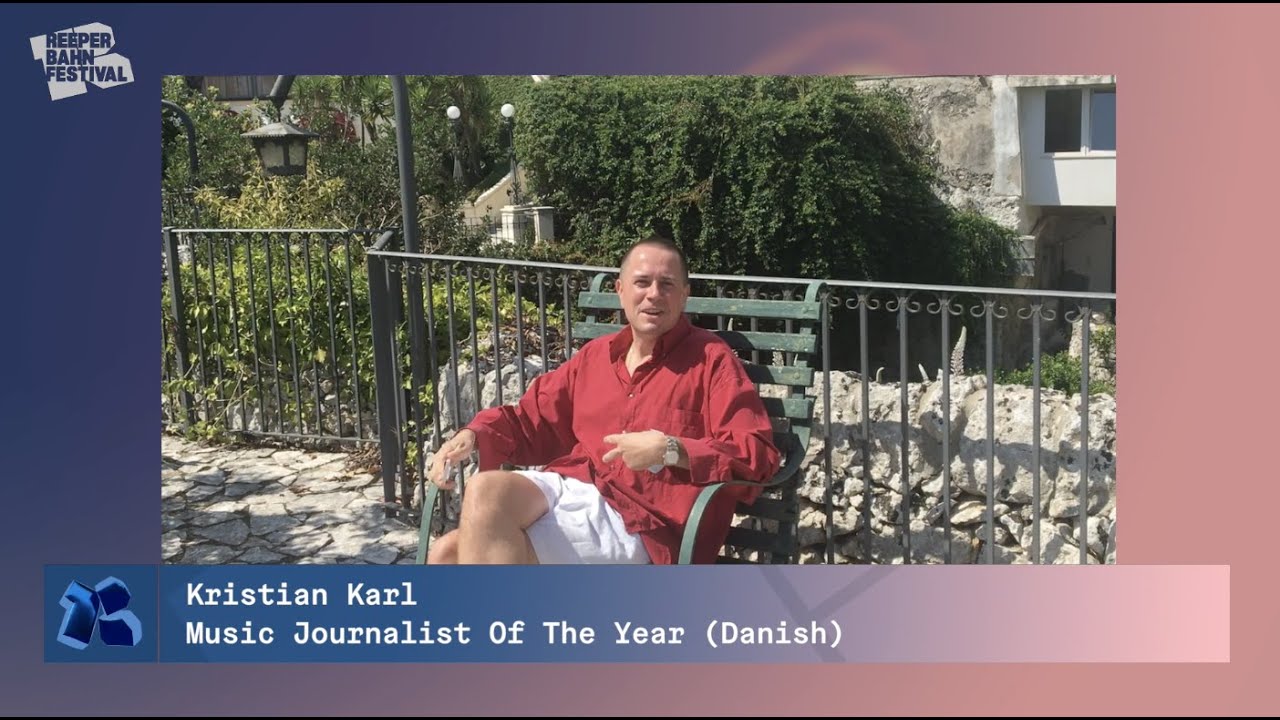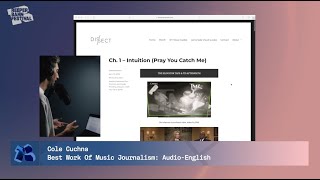
The IMJA Winners 2020
Best
Music-
Journalist
of the year
german
Miriam Davoudvandi // Freelance music journalist, Das Wetter, Juice, Spex, Backspin
Watch the official "thank you" from Miriam Davoudvandi
The prize for the "Music Journalist*of the Year" proves to be particularly tricky to award every year. If in the other categories it is already difficult enough to weigh up individual music journalistic works against each other, the overall performance of colleagues over a period of a year is almost impossible to compare. Especially not if the candidates for a prize look like they did this time.
But Miriam Davoudvandi has made the decision this year, which was almost impossible to make, thankfully easy. She simply met us again and again and again in the submissions for the IMJA 2020. Her essay on Tierra Whack, published by Das Wetter, made it onto the shortlist in the category "Best music journalistic work - text". Together with last year's prizewinner Malcolm Ohanwe, she was also shortlisted for "Slang & Sprache im Deutschrap" in the category "Best music journalistic work" in the "Multimedia" category. The article that ultimately won the race here portrays among other things ... drum roll ... Miriam Davoudvandi. I bet: If her brand-new podcast "Danke, gut.", in which she conducts empathetic talks about mental health, had started just a little earlier, our audio jury would have been able to deal with this woman as well.
Miriam Davoudvandi has been a constant presence not only in German rap, but also in music journalism across genres in recent months, and we think that's damn right. Her expertise, her professionalism, her not at all confrontational, but never uncritical manner and, all outshining everything, her obvious ardent love of the subject make her work so informative, valuable and entertaining, and she herself a colleague to whom every success is heartfelt. Because she deserves it.
For the jury: Dani Fromm
Best
Music-
Journalist
of the year
english
Laura Snapes // Music editor, The Guardian
Watch the official "thank you" from Laura Snapes
This year's prize for the "Best Music Journalist of the Year" goes to Laura Snapes, who has been writing particularly well about pop culture for years. She was initially an editor at the NME and Pitchfork and has been responsible for pop culture at the Guardian since 2018. Laura Snapes not only writes about music, she also favours a broader approach to pop culture. Kim Kardashian's handling of her husband's illness or Madonna's false statements about Corona stand next to precise and funny reviews of Taylor Swift's great last album. An oral history of the French band Phoenix ("Liberté, Égalité, Phoenix!") is the only book she has written so far. But there is still a lot to come, we can expect that. For years Laura Snapes has been intrepidly researching structural misogyny in the music industry and its subtle and perfidious formations in what has been called the Independent music scene, where, as we all know, at least by its own standards, the music industry is oh so teeming with tender, enlightened, sad and feminine men: A protective shield behind which misogynistic behaviour could be particularly well hidden. "Beta male misogyny" directed against women. Despite public sexist defamation attempts by important indie stars, Snapes does not let herself be deterred from analysing misogyny in its very different forms. To pick out a rather harmless degradation: It’s mostly female pop stars that are considered to be “too pop”, for example. But for us and the IMJA Snapes cannot be “pop enough”.
For the jury: Mascha Jacobs
Best
Music-
Journalist
of the year
french
Ouafa Mameche// Editor / Journalist
Watch the official "thank you" from Ouafa Mameche
With her column-turned-blog-turned-publishing company „Faces Cachées“ („Hidden Faces“) Ouafa has added depth to the portraits of French rap in the pop-cultural discourse. Meanwhile hosting her own podcast she gives a voice to artists that are inspiring but often invisible.
She is a regular or former contributor for the following media focusing on urban music: webzine ABCDR du son, radio show AfterRap broadcasted on state radio Mouv', App Keakr, web radio founded by French rapper Booba OKLM Radio... besides launching her own podcast about french rap.
She has written a reflexive article entitled "Retour d’expérience sur l’activité de critique musical" (that can be translated into "Feedback on being a music critic"). The article develops ideas she has expressed in several university symposiums and professional panels. It has been published in the collective book „Perspectives esthétiques sur les musiques Hip Hop“ (Chants Sons / PUP 2020).
The IMJA jury
Best Music Journalist of the Year – Danish
danish
Kristian Karl // Journalist, soundvenue.com
Watch the official "thank you" from Kristian Karl
Danish rap and hip-hop has undergone an enormous change within the past couple of decades. Hiphop has gone from being an underdog to a force to be reckoned with. In other words, what we’ve seen in Denmark is the same that has happened to hip-hop on an international scale: it is pretty much the new pop. Hip-hop is everywhere. It’s on TikTok, on Soundcloud, it thrives in odd corners of the internet and it literally follows its own beat. Which is why it is so valuable with a music journalist who knows exactly what he or she is dealing with. Enter: Kristian Karl. He is a hip-hop connoisseur, but first and foremost he is an excellent communicator of music. He is the main host of Soundvenue Standard, a weekly hip-hop podcast, but he is also a great writer. And whether he writes insightful commentary or reports from the very streets, where so much of hip-hop is born, he tells his stories with an ease and a clarity that speaks to both the genre’s insiders and people following from the outside.
For the jury: Pernille Jensen
The Year's
Best Work
Of Music
Journalism
Text - german
Ariana Zustra // Ariana Grande und das "Blackfishing" - Wo beginnt Rassismus? - Kaput (08/2019)
Watch the official "thank you" from Ariana Zustra
Ariana Zustra, born in 1987, musician and freelance music journalist, investigated the phenomenon of blackfishing in August 2019 for the "Kaput" magazine. One of them is the 26-year-old pop singer Ariana Grande, who is accused of this as racism. Not only because the "Black Lives Matter" movement is experiencing a new wave of support in the wake of the death of George Floyd in May 2020, the jury sees Zustra's text as an exciting contribution to the current debate. But also because Ariana Zustra finds a surprising answer to the question: "Is blackfishing the new blackfacing?
In "Ariana Grande and 'Blackfishing' - where does racism begin?" Zustra shows the transformation of the former Disney star, which takes place on many levels. Not only her looks, but also Grande's music and language make use of the cultural traditions of an oppressed black minority and that, as Grande is accused, for marketing reasons alone, i.e. to make money. The fact that Grande uses her "skin color" in the way it promises the most success makes "being black" an accessory, writes Zustra, only to subsequently offer a retrospective look at the phenomenon of cultural appropriation. "There is no clear-cut 'black' or 'white' culture," Zustra analyzes and finds a concluding approach that gets by without condemnation: "Instead of restricting white people's approach to a 'black culture', the goal should be to ensure that blacks are not discriminated against because of their culture and skin color.
Zustra's derivation and argumentation abstains from everything that would have been easy for the journalist: hitting a blond pop star who has discovered being black in order to make more money. The author inspires her readers* to stand up for the equality of all cultures instead of having an opinion prematurely. A conclusion that could not be more topical.
For the jury: Susanne Baller
The Year's
Best Work
Of Music
Journalism
Text - english
Kieran Press-Reynolds // How TikTok is Taking the Tunes out of Pop - Highsnobiety (03/2020)
Watch the official "thank you" from Kieran Press-Reynolds
Having taking part in the jury for the International Music Journalism Award for a few years now, I have noticed a certain pattern that differentiates German music journalism from its English or American counterparts. German pieces are mostly about individual artists or bands; Anglo-American writing more often covers particular phenomena or scenes. For me personally the latter seems more fascinating, and teaches me more.
Kieran Press-Reynolds' text about TikTok Rap, entitled “How TikTok Is Taking The Tunes Out Of Pop“ is a prime example of that investigative approach. After identifying a seemingly new phenomenon - not just a new trend, but a new form of cultural behaviour connected to a new digital platform - he sits down and properly researches what exactly this comprises., He defines this newness in what you could call a „taxonomy of new subcultures and sounds“, as a source close to him explained to me. Press-Reynolds' mindblowing conclusion is essentially twofold: in the future, a song need not be any longer than 15 seconds - the length of a TikTok clip; and where there used to be melody, there will be distorted bass loops instead, as these are highly „clippable“.
Only after having read his piece with great enjoyment (and promptly getting lost on TikTok for two hours watching „Renegade“ clips) I took a closer look at who the author actually was, and realised why his name sounded familiar. And indeed, music and cultural writers Joy Press and Simon Reynolds are his proud parents; a certain analytical talent and linguistic flair seem to run in the family. Speaking of running, at the still tender age of 21 Kieran Press-Reynolds can already look back at several years as a promising athlete and long-distance runner. Let’s hope he translates his dedication to going the distance to his writing. Press-Reynolds concludes his awarded text with the observation that Andy Warhol‘s 15 minutes of fame have now shrunk to a mere 15 seconds. I predict we will enjoy at least 15 years of his quality insights about as yet unidentified music phenomena.
For the jury: Hans Nieswandt
The Year's
Best Work
Of Music
Journalism
Text - danish
Ralf Christensen, Louise Rosengreen, Rasmus Steffensen, Sophia Handler // "Informations drømmefestival" (Artikelserie in der Tageszeitung Information)
When 2020 began, no one was prepared for the fact that a new virus would deal a devastating blow to the music scene and also make 2020 the year of no festivals. However, a team of music journalists from the newspaper Information refused to give in, and proceeded to create their own imaginary dream festival with a line-up to take your breath away.
Kate Bush, Joni Mitchell and Frank Ocean as well as less familiar artists like Zambian hip hop empress Sampa the Great, the wounded coolness of Swedish rapper Yung Lean and the mythological political folklore of DakhaBrakha from Ukraine are the subjects of the magnificently written concert reviews by Ralf Christensen, Louise Rosengreen, Sophia Handler and Rasmus Steffensen.
The concerts never took place, but the descriptions make you see and feel them clearly. Kate Bush, who almost never plays live, is imagined in a rare set which includes the singer floating inside a transparent bubble filled with phosphorescent, ice blue water and later clad in a magnetic dress which attracts bloody daggers from the stage floor. Joni Mitchell is the wise old woman in a high seat clutching a cane, surrounded by revering young artists like Nadia Reid, Laura Marling, Bedouine and Brandi Carlile. Frank Ocean turns one of the big parks of Copenhagen into a quadrophonic dream display with dazzling musical use of the many cars he has namedropped in his songs. The articles also unfold the life stories of the artists, presenting readers to new sides of well known musicians as well as introducing exciting new names.
Informations „Drømmefestival“ turned the sad void of no festivals into a celebration of the transformative powers of live music and the festival experience while showcasing music journalism at its very best.
For the jury: Anya Mathilde Poulsen
The Year's
Best Work
Of Music
Journalism
Text - french
Sophian Fanen // "Le Chants des Machines: l'intelligence artificielle entre dans la pop" (Les Jours)
Watch the official "thank you" from Sophian Fanen
Perfectly grasps the concept of Artificial Intelligence and how it pervades pop music.Brilliant analysis of the current music culture in the quality and depth we are used to by articles of Sophian Fanen.
The IMJA jury
The Year's
Best Work
Of Music
Journalism
Audio - german
Nabila Abdel Aziz // Wie die Aufstände in der Arabischen Welt die arabische Musik revolutionierten – Zündfunk / BR (02/2020)
Watch the official "thank you" from Nabila Abdel Aziz
No, music is not a "universal language", as is often claimed. Without cultural context, without interpretation and context, access is often difficult - which is why Nabila-Abdel Aziz has done an immensely valuable piece of educational work for many of us with her feature on the transformation of music in the Arab world.
The deeper she takes us into the alternative, eclectic music scenes of countries such as Tunisia, Egypt, Syria and Sudan, the more obvious it becomes that our usual horizons are not infrequently only a narrow margin of our horizons. How wonderful to get new insights and outlooks here! Learning to understand how a new generation of Arab artists* - often at the limits of the legality of their respective homelands - is working to drown out the lulling soundtrack of oppressive regimes with their own voices is a real enrichment.
For the jury: Christoph Lindemann
The Year's
Best Work
Of Music
Journalism
Audio - english
Cole Cuchna // Dissect (Podcast) - S6 Beyoncé Lemonade - Spotify (04/2020)
Watch the official "thank you" from Cole Cuchna
Dissect, this podcast is dedicated to a major hip hop album every season. Each song is accompanied by a 40-minute episode, in which text passages, musical structure and levels of meaning are analyzed in loving detail. Cole Cuchna researches, analyses, writes, speaks and produces everything on his own.
Recently he dissected Beyoncé's album "Lemonade". There Cuchna has even gone one step further to do justice to this work. His analysis is not limited to the auditory level of this record, but he also incorporates the accompanying visual album into his interpretation and analysis. In doing so, he moves from detail to detail.
Cuchna decodes step by step individual video scenes and lines of text that have historical relevance in the African-American past in order to explain and classify them comprehensively.
This Beyoncé season of Dissect is of great importance, especially at a time when millions of people around the world take to the streets to demonstrate against police violence against the black community, when systemic racism is being exposed. A song that we sing along to in the car and whose music video runs on the laptop on the side suddenly takes on a somber heaviness and a cultural contextualization that would otherwise have escaped us.
In addition, Cuchna praises pop music, which by now is usually discussed with only a few catchwords, by digging deeply into the matter and working out its artistic value. Thus Cuchna enriches pop music culture in a way that is unparalleled in today's media world.
For the jury: Claudia Kamieth
The Year's
Best Work
Of Music
Journalism
Audio - danish
Lucia Odoom // "Politikens Poptillæg" Podcast
Watch the official "thank you" from Lucia Odoom
In an internet age where the encyclopedic wisdom of the conventional music ‘expert’ is losing ground, this weekly podcast has taken a radically original and smart approach to music journalism during its four years of existence. Enthusiastically hosted by music critic Lucia Odoom in her highly personal voice, this “pop supplement” reaches beyond the individual album format to connect pop music to wider discussions across the cultural field. With cosy yet qualified panel conversations and sonically interesting production, the podcast has become a common platform for affectionate, curious and analytical conversations about pop culture. It’s a place where high and low have equal rights, and where you can expect to hear the deeper meaning of hair clip trends or issues of social injustice discussed next to Soundcloud rap or the iconic status of Joni Mitchell. Sensitive to what moves and touches us as music consumers, Lucia Odoom shares her impressive overview while exploring the way that music is often deeply intertwined with our daily lives and personal memories.
For the jury: Anna Ullman
The Year's
Best Work
Of Music
Journalism
Multimedia - german
Miriam Fendt, Fridolin Achten, Frederik Kunth, Philipp Laier // Visa Vie, Josi Miller, Cashmiri / Co.: Wie diese Frauen Deutschrap prägen - Puls Musik (03/2020)
We have been told the fairy tale that German hip-hop is a man's world long enough. "Visa Vie, Josi Miller, Cashmiri and Co.: How these women shape Deutschrap" from the series "PULS Musik Analyse" makes a valuable contribution to the urgently needed change of perspective.
Solidly researched, comprehensibly structured and pleasantly presented, the almost quarter-hour video portrays women who have shaped all areas of rap as producers, DJs, photographers, directors, journalists, podcasters and organizers. The choice of protagonists is not limited to the three names dropped in the headline. Behind the "and Co." in the title are, among others, Melbeatz or Katja Kuhl, who already played a major role in shaping Deutschraps halcyon days. This makes the article not only purely informative, but subversively undermines the common narrative. You see? Deutschrap was never really a male domain. Anyone who still believes this hasn't looked very closely.
The fact that this realization is once again being moderated by a man in front of the camera might at first upset some of you. In fact, however, it is to be welcomed when changes no longer remain just a matter for those directly affected. Only when feminism is no longer a women's only issue, but the concerns and aspirations of all, all of us have won. Today, however, Miriam Fendt, Friedl Achten, Frederik Kunth and Philipp Laier are the first to win. Congratulations. (
For the jury: Dani Fromm
The Year's
Best Work
Of Music
Journalism
Multimedia - english
Alzo Slade, Eric Weinrib, Lyle Kendrick, Kelly Kendrick, Jared Perez, Daniel Plyam // Russia's War on Hip-Hop - Vice Investigates (11/2019)
„Artists are not the root cause of the problems, artists only mirror the problems.” This was the quote used at the beginning of the documentary which rings so true in the face of most politically charged music, and with hip-hop since its invention in the 1970’s at block parties to its cultural and artistic movement and becoming a mirror of society which became stronger in the 80’s to the perfect form vocalizing and expressing the woes of the black / brown community caused by centuries of social injustices.
Today hip-hop and rap has become for young people all over the world a tool for expression and holds up the mirror to their own countries societal and political injustices twisting in influences of their own cultures musical heritages.
I found this piece about the war on hip-hop in Russia enlightening and a deep dive into a country and its youth who seem to not show any signs of giving up, despite the push against their messages of discontent from politicians, local officials and/or vigilante groups who somehow fear the danger of youth culture and possibly a tear in the political beliefs of a broken system. This all happening in the foggy world between the old soviet propaganda to which the politicians and officials hold onto and the new found freedoms of expression that the listeners of hip-hop and rap seemed to be filled with. I found the investigation and interviews that Alzo Slade conducted maintained lightness despite and against the very heavy backdrop of what the artists were going through and the officials who he was able to speak with and vigilantes serious tone but was able to show the reflection that the younger generations are having about themselves and their role at this particular cultural moment in time. It feels that Russian youth were unknowingly waiting for the internet to come and ignite this love of and artistic expression that Hip Hop has offered but have made it their own.
For the jury: Melissa Perales
Best Work
Of Music Journalism,
Under 30
German
Stefan Sommer // Neuer Deutscher Rechtsrap: Chris Ares - PULS BR / Süddeutsche Zeitung (09/2019)
Watch the official "thank you" from Stefan Sommer
In a factual, well-researched and analytically profound tone of voice, Stefan Sommer shows the entanglement of a "patriotic rapper" with party-political strategies and the alt-right scene.
Pop music journalism as investigation and enlightenment, taking a stance rather than striking a pose.
Bahar Sheikh // Opfer, Täterin, so vieles mehr (Paywall) - Missy (09/2019)
Watch the official "thank you" from Bahar Sheikh
Shoulders the task of expressing the dichotomy that the book of the controversial figure of the Deutschrap scene leaves behind, while commenting on conflicts in current feminist debates about sex work.
Sebastian Lessel // Orientalismus wegflexen - Spex (11/2019)
Watch the official "thank you" from Sebastian Lessel
Sovereign introduction to the new normality of a non-European, non-American pop culture, here the one from the Maghreb. Pleasantly self-evident text about an alternative musical reality, not alienating, without patronising, not sucking up to its topic.
For the jury: Christian Tjaben















